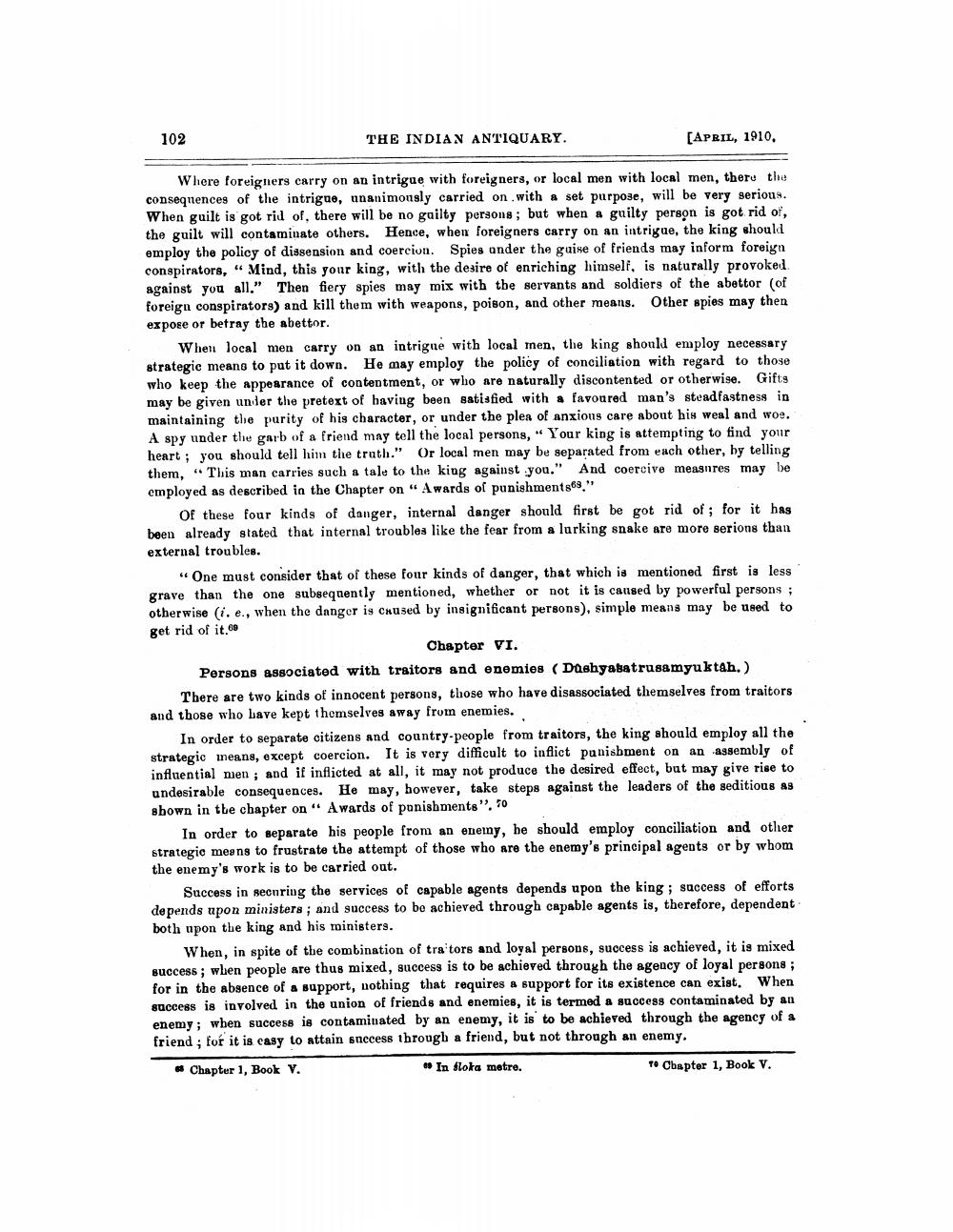________________
102
THE INDIAN ANTIQUARY.
[APRIL, 1910.
Where foreigners carry on an intrigue with foreigners, or local men with local men, there the consequences of the intrigue, unanimously carried on with a set purpose, will be very serious. When guilt is got rid of, there will be no guilty persons; but when a guilty person is got rid of, the guilt will contaminate others. Hence, when foreigners carry on an intrigue, the king should employ the policy of dissension and coercion. Spies under the guise of friends may inform foreign conspirators," Mind, this your king, with the desire of enriching himself, is naturally provoked. against you all." Then fiery spies may mix with the servants and soldiers of the abettor (of foreign conspirators) and kill them with weapons, poison, and other means. Other spies may then expose or betray the abettor.
When local men carry on an intrigue with local men, the king should employ necessary strategic means to put it down. He may employ the policy of conciliation with regard to those who keep the appearance of contentment, or who are naturally discontented or otherwise. Gifts may be given under the pretext of having been satisfied with a favoured man's steadfastness in maintaining the purity of his character, or under the plea of anxious care about his weal and woe. A spy under the garb of a friend may tell the local persons, "Your king is attempting to find your heart; you should tell him the truth." Or local men may be separated from each other, by telling them," This man carries such a tale to the king against you." And coercive measures may be employed as described in the Chapter on "Awards of punishments69."
Of these four kinds of danger, internal danger should first be got rid of; for it has been already stated that internal troubles like the fear from a lurking snake are more serions than external troubles.
"One must consider that of these four kinds of danger, that which is mentioned first is less grave than the one subsequently mentioned, whether or not it is caused by powerful persons; otherwise (i. e., when the danger is caused by insignificant persons), simple means may be used to get rid of it.00
Chapter VI.
Persons associated with traitors and enemies (Dushyasatrusamyuktah.)
There are two kinds of innocent persons, those who have disassociated themselves from traitors and those who have kept themselves away from enemies.
In order to separate citizens and country-people from traitors, the king should employ all the strategic means, except coercion. It is very difficult to inflict punishment on an assembly of influential men; and if inflicted at all, it may not produce the desired effect, but may give rise to undesirable consequences. He may, however, take steps against the leaders of the seditious as shown in the chapter on " Awards of punishments". To
In order to separate his people from an enemy, he should employ conciliation and other strategic means to frustrate the attempt of those who are the enemy's principal agents or by whom the enemy's work is to be carried out.
Success in securing the services of capable agents depends upon the king; success of efforts depends upon ministers; and success to be achieved through capable agents is, therefore, dependent both upon the king and his ministers.
When, in spite of the combination of traitors and loyal persons, success is achieved, it is mixed success; when people are thus mixed, success is to be achieved through the agency of loyal persons; for in the absence of a support, nothing that requires a support for its existence can exist. When success is involved in the union of friends and enemies, it is termed a success contaminated by an enemy; when success is contaminated by an enemy, it is to be achieved through the agency of a friend; for it is easy to attain success through a friend, but not through an enemy.
Chapter 1, Book V.
69 In floka metre.
To Chapter 1, Book V.




